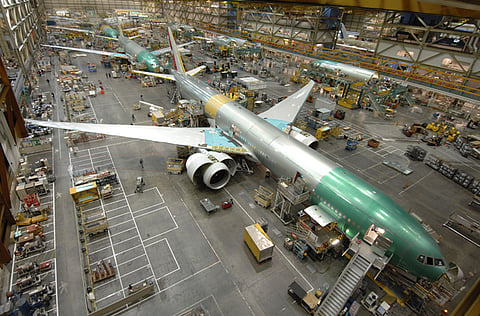Boeing builds 1000th 777 aircraft, for Emirates
Boeing said it began assembling 1,000th Boeing 777 aircraft, to be delivered to Emirates Airline in 2012

Dubai: US planemaker the Boeing Company said, its workers began assembling the 1,000th Boeing 777 aircraft, which will be livered to Dubai-based Emirates Airline in March 2012.
The airplane is a Boeing 777-300ER (extended range) model.
"Emirates is the largest 777 customer with 95 777s currently in its fleet. The 1,000th 777 will be its 102nd," Boeing said in a statement issued earlier today.
Emirates has more than 160 widebodied aircraft on its fleet serving a growing network of more than 115 destinations in 67 countries connecting major cities in all the six continents.
“We have continued to invest in our eco-efficient aircraft fleet; in strengthening our global route network; and also in supporting the infrastructure for our growing business and it continues to pay off,” Shaikh Ahmed Bin Saeed Al Maktoum, President of Dubai Civil Aviation Authority and Chairman and Chief Execuive of Emirates Airline and Group, said in a statement.
The aircraft’s production began with loading of the 97-foot (29.5 meter) wing spar - the main support structure for the wing – into a giant tool that automatically drills, measures and installs more than 5,000 fasteners into the spar. The spar components are built in Auburn, Washington, by Boeing Fabrication employees.
"We reached this milestone in only 16 years, eight years sooner than the runner up the 747, because of the enormous popularity of the airplane by the airlines that operate it, and the passengers who fly on it," said Larry Loftis, vice president and general manager of the 777 programme.
"Sixty-four airlines have ordered 1,295 777s. The numbers prove that the 777 is the world's preferred airplane. In fact, it's preferred 1,000 times over."
Ever since 777s entered the service in the 1990s, Emirates had begun to rely on the twin-engine jet that is much more fuel efficient compared to its rival models.
Saj Ahmad, a UK-based aviation analyst says: “Leading the charge for Emirates' growth has been the expansion of its Airbus A380-800 and Boeing 777-300ER fleets so that fuel and emissions costs have been cut despite increases in fuel while at the same time leveraging its strength as a widebody, long haul operator to launch new routes at a time when most other airlines have been reticent to do so.”
A ceremony to mark the start of production was held on Wednesday in Everett.
"Additional employee thank-you events will be held as the airplane moves through the 49-day build process," the airline said in a statement.
"We couldn't have reached this milestone without the innovation and inspiration of the thousands of employees here at Boeing and at the more than 500 suppliers around the globe that build the 777," Loftis said. "We thank them and honor them for their contribution to aviation history," he said.
Emirates, the biggest Arab carrier, last week reported a net profit of Dh827 million ($225 million) on Dh30.3 billion ($8.3 billion) revenues for the first six months of its current financial year ending 30th September 2011.
Since 2004, when Emirates acquired its first long-haul wide-body aircraft, allowing for much broader global expansion, the airline has opened 39 new outstations. The airline continues to expand its global footprint, having launched Geneva, Copenhagen and St. Petersburg since April 2011 and will continue with eight additional new route launches including Baghdad on 13 November and Rio de Janeiro, Buenos Aires, Harare, Lusaka, Dallas, Seattle and Dublin in early 2012.
Emirates' current fleet size is 161 aircraft. Since the beginning of its current financial year, the airline has received delivery of ten new wide body aircraft, with another 13 new aircraft scheduled to be delivered before the end of the financial year (31 March 2012).
Sign up for the Daily Briefing
Get the latest news and updates straight to your inbox



